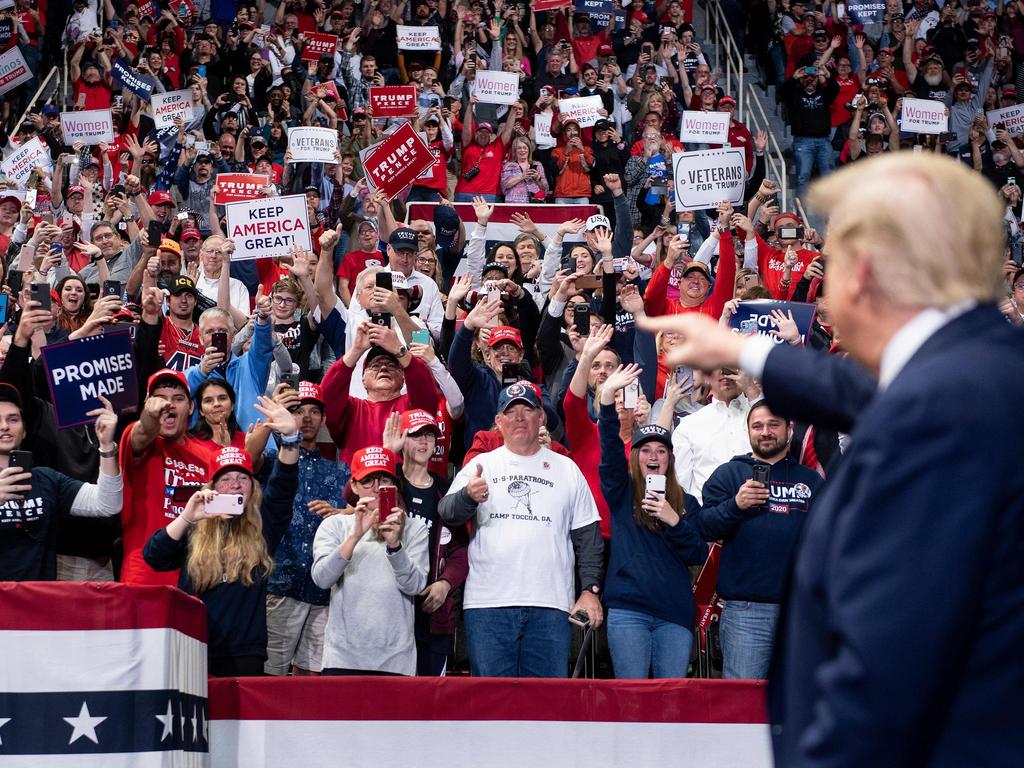Donald Trump sees sunshine, Joe Biden sees twin storms
Republicans and Democrats fight to spin the latest US jobs numbers to their advantage, but face tremendous political risks.

The US economy has posted its best single-month job gain in history. US unemployment is at one of its worst points since the Great Depression. Both are true.
As Republicans and Democrats fight to spin Thursday’s (Friday’s AEST) jobs numbers to their advantage, both sides face tremendous political risks in navigating a delicate and defining issue heading into the presidential campaign’s final months.
Democrats, led by presumptive nominee Joe Biden, seized on the growing threat presented by coronavirus after the better-than-expected numbers were released, a stance the Republicans called rooting against America’s recovery.
Donald Trump claimed a major economic victory and played down the health threat, even as an explosion of new infections threatened to stall, or even reverse, the economic gains.
Deep uncertainty lies ahead, experts warn, despite two months of record jobs growth. And with only two more monthly jobs reports expected before the November 3 election, the duelling visions of the US economy establish a new frame for the high-stakes debate ahead.
“Today’s announcement proves that our economy is roaring back,” Mr Trump said at the White House after the June numbers were released. “The crisis is being handled.”
Two hours later, Mr Biden offered a darker assessment.
“There’s no victory to be celebrated,” the former vice-president said in a video recorded at his home in Delaware.
“We’re still down nearly 15 million jobs and the pandemic is getting worse, not better.”
“Today’s report is positive news and I’m thankful for it — for real. But make no mistake, we’re still in a deep, deep job hole because Donald Trump has so badly bungled the response to coronavirus.”
Thursday’s data showed a surge of 4.8 million new jobs last month, a snapshot of the economy as of three weeks ago. The US unemployment rate improved from 13.3 per cent in May to 11.1 per cent in June as many Americans thrown out of work by COVID-19 were called back. But the jobs numbers were announced just as the nation’s confirmed coronavirus infections soared to an all-time daily high of 50,700, more than doubling over the past month.
The spike, centred primarily in the South and West, has led states such as California, Texas, Arizona and Florida to re-close or otherwise clamp down again on bars, restaurants, cinemas, beaches and swimming pools, throwing some workers out of jobs for a second time. Those losses will show up in next month’s government unemployment report.
The Trump campaign believes that nothing matters more to the President’s re-election than the state of the economy. With many Americans reporting that the country is moving in the wrong direction under his leadership, he has a lot of work to do. Still, the President’s strongest ratings centre on the economy, as has been the case throughout his tenure. About half of Americans say they approve of Mr Trump’s handling of the economy, according to a poll released last month by The Associated Press-NORC Centre for Public Affairs Research.
Justin Wolfers, a professor of economics and public policy at the University of Michigan, said that Thursday’s numbers confirmed the economy was in “slightly less” of a “dreadful economic hole”. “You just look out the window and you know things are grim,” he said. “The first, second and third most important things for the economy right now are the progress of the disease.”
Michael Strain, director of economic policy studies at the American Enterprise Institute, said the virus continued to pose a “major potential threat” to the nation’s economic comeback, especially in light of new reports that hospital systems in some states were reaching capacity.
Jared Bernstein, a Biden economic adviser, predicted the pace of economic growth would slow considerably in the coming months because of the Trump administration’s inability to contain the pandemic. Mr Trump has not employed a co-ordinated national response to the health threat, preferring to let state and local leaders adopt their own strategies.
AP







To join the conversation, please log in. Don't have an account? Register
Join the conversation, you are commenting as Logout